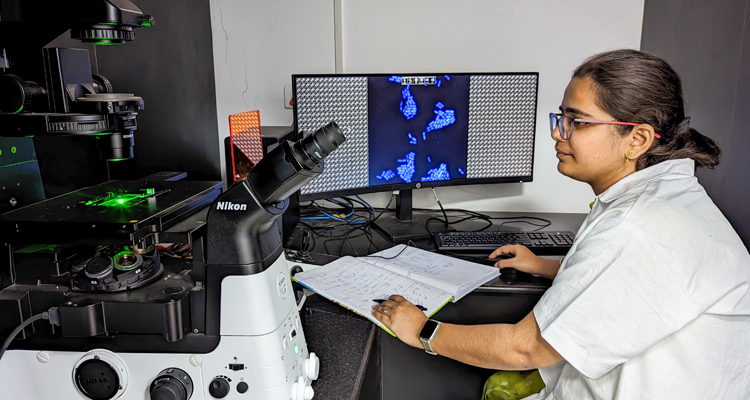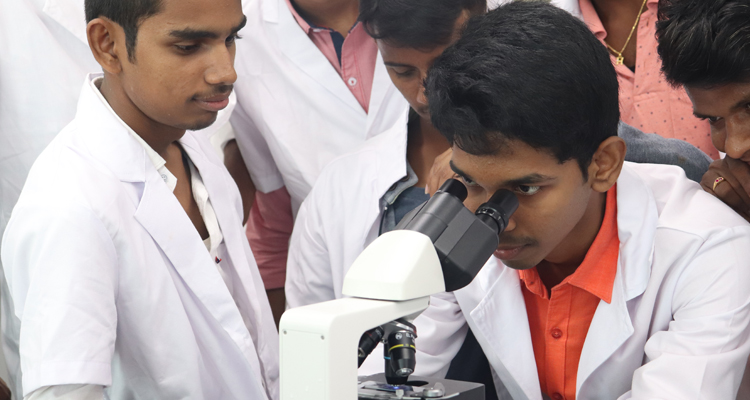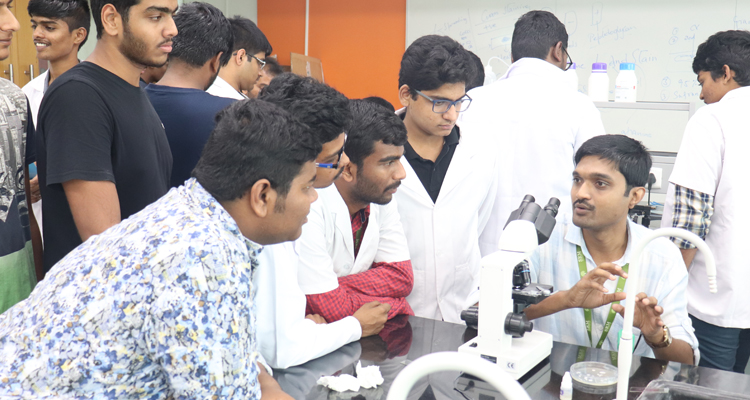SRM University-AP > Department of Biological Sciences > BSc Intergrative Biology
Introduction to the Programme
BSc Integrative Biology programme offers comprehensive coverage of all major contemporary subjects in Biology to build the perfect foundation in basic science for graduates to pursue higher academic interests. The Honours programme offers the students a unique opportunity to widen their scope of learning by choosing Foundation Courses and Minors from other disciplines at the School of Liberal Arts and Social Sciences.
Brief History
The Four-years B.Sc program with hands-on research training was started in 2019. Majority of the graduates are placed at prestigious institutes like University College London, University of Bordeaux, University of Paris-Saclay and others.
Curriculum Highlights
Students will secure nearly 160 academic credits through 4800 learning hours. Besides Major and Minor (of student’s choice) specialization, students are also trained through courses like Ability Enhancement, Value Added, Skill Enhancement and Multidisciplinary/Interdisciplinary nature. Please refer to our curriculum for more details.
Core Courses
| Biomolecules | Basic Concepts in Microbiology | Cell Biology |
| Concepts of Genetics | Evolutionary Biology | Concepts of Molecular Biology |
| Experimental methods in Biology | Introductory Biophysics | Introduction to Developmental Biology |
| Genetic Engineering | Immunobiology | Plant and Animal Physiology |
| Introduction to Biotechnology | Bioinformatics | Neurobiology |
| Signal Transduction | Introduction to Omics | Cancer and Stem cell Biology |
Foundation Courses
| Chemical Basis of Life | Mathematicsfor the Physical World |
| Fundamentals of Computing | Emergin Technologies |
| Principles of Management | Psychology for Everyday Living |
Value Addition, Ability Enhancement and Skill Enahncement courses
| Value Addition | Ability Enhancement | Skill enhancement |
|---|---|---|
| Environmental Science | Speaking & Reading | Analytical Reasoning and Aptitude skills |
| Universal Human Values and Ethics | Effective writing and Presentation Skills | Entrepreneurial Mindset |
| Community Serive and Social Responsibility | Problem Solving Skills | Digital Literacy |
| Co-Curricular Activities | Skills: Resume writing, GD and Interview |
Programme Educational Objectives (PEO)
Programme Specific Outcomes (PSO)
Programme Outcomes (PO)
Capable of demonstrating comprehensive knowledge and understanding of one or more disciplines that form a part of an undergraduate Programme of study.
Ability to evaluate the reliability and relevance of evidence; Capacity to extrapolate from what one has learned and apply their competencies to solve different kinds of non-familiar problems, rather than replicate curriculum content knowledge; and apply one’s learning to real-life situations.
Capability to apply analytic thought to a body of knowledge; analyse and evaluate evidence, arguments, claims, and beliefs based on empirical evidence; identify relevant assumptions or implications; formulate coherent arguments; critically evaluate practices policies and theories by following a scientific approach to knowledge development. Critical sensibility to lived experiences, with self-awareness and reflexivity of both self and society.
Ability to analyse, interpret and draw conclusions from quantitative/qualitative data and evaluate ideas, evidence and experiences from an open-minded and reasoned perspective pertaining to incorporating into a system.
A sense of inquiry and capability for asking relevant/appropriate questions, problematising, synthesising, and articulating; Ability to recognise cause-and-effect relationships, define problems, formulate hypotheses, test hypotheses, analyse, interpret and draw conclusions from data, establish hypotheses, predict cause-and-effect relationships; ability to plan, execute and report the results of an experiment or investigation.
Capability to use ICT in a variety of learning situations; demonstrate the ability to access, evaluate, and use a variety of relevant information sources; and use appropriate software for analysis of data.
Understand the impact of scientific solutions in societal and environmental contexts and demonstrate the knowledge of and need for sustainable development.
Possess knowledge of the values and beliefs of multiple cultures and a global perspective; and capability to effectively engage in a multicultural society and interact respectfully with diverse groups; Ability to embrace moral/ethical values in conducting one’s life, formulate a position/argument about an ethical issue from multiple perspectives, and use ethical practices in all work. Capable of demonstrating the ability to identify ethical issues related to one’s work. Avoid unethical behaviour such as fabrication, falsification or misrepresentation of data or committing plagiarism, not adhering to intellectual property rights; appreciating environmental and sustainability issues; and adopting objective, unbiased and truthful actions in all aspects of work.
Ability to work effectively and respectfully with diverse teams; facilitate cooperative or coordinated effort on the part of a group and act together as a group or a team in the interests of a common cause and work efficiently as a member of a team.
Ability to express thoughts and ideas effectively in writing and orally; Communicate with others using appropriate media to confidently share one’s views and express herself/himself; demonstrate the ability to listen carefully, read and write analytically, and present complex information clearly and concisely to different groups.
Capability for mapping out the tasks of a team or an organisation, setting direction, formulating an inspiring vision, building a team that can help achieve the vision, motivating and inspiring team members to engage with that vision, and using management skills to guide people to the right destination, in a smooth and efficient way.
Ability to work independently, identify appropriate resources required for a project, and manage a project through to completion; Ability to acquire knowledge and skills, including “learning how to learn”, that is necessary for participating in learning activities throughout life, through self-paced and self-directed learning aimed at personal development, meeting economic, social and cultural objectives, and adapting to changing trades and demands of the workplace through knowledge/skill development.




